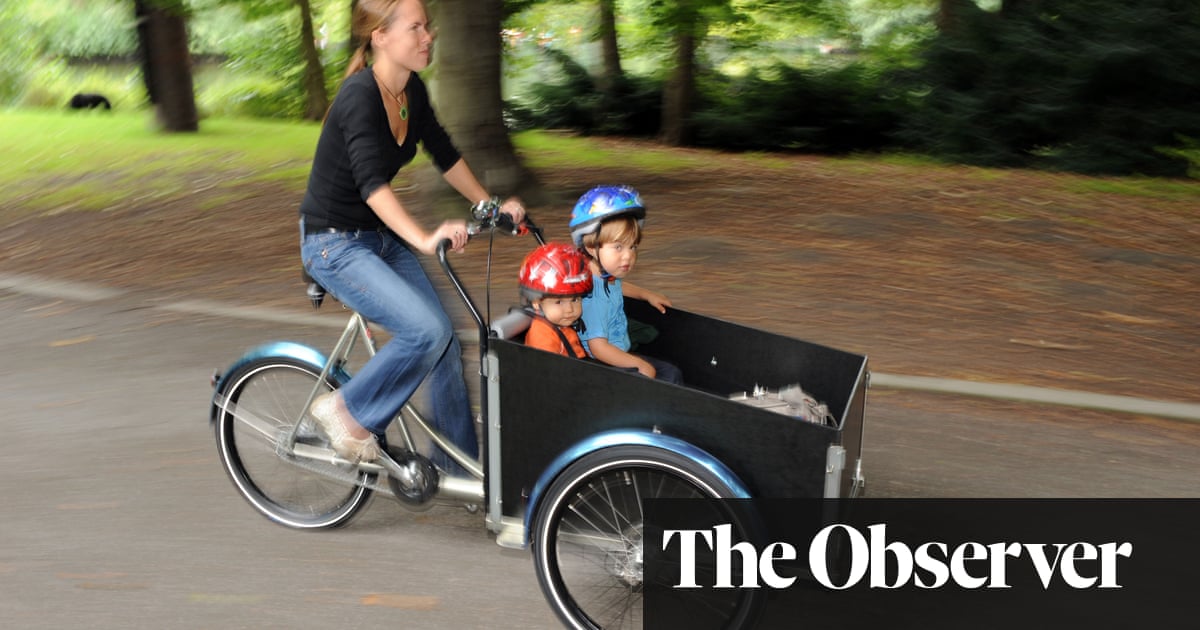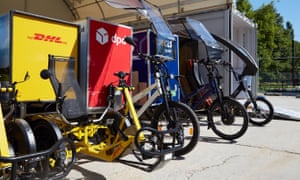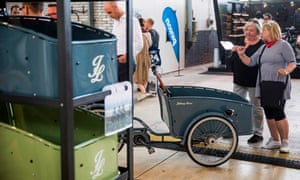As Berlin tries to switch to greener transport, people are choosing the bike, not the electric car and its becoming a status symbol

In a fashionable corner of the capital of Germany, Europes car nation, parents picking up or dropping off their offspring have lined the edge of a popular playground with luxury vehicles. There are summery convertibles, wood-panelled multi-seaters and slim racers but none of them has four wheels.
Jan Edler, an architect, has picked up his son Laszlo from daycare with a Bullitt, a Danish-built cargo bike with a platform spacious enough to fit the one-year-old and the daily grocery shopping.
The family car, he says, has been gathering rust ever since he invested in the aluminium-framed two-wheeler, partly because cargo bikes manage to evoke the same romantic notions that cars once used to: I just find it an incredibly liberating experience to get around a city on a cargo bike, Edel says. I feel safe among the traffic, and my son has something to look at.
With new CO2 emissions targets due to be phased in from 2020 and the reputation of Germanys car industry in urgent need of repair after the dieselgate scandal, the countrys federal government has been trying hard to think of ways to achieve what it calls the Verkehrswende, the green transformation of its transport sector.
A 4,000 purchase subsidy for e-cars, belatedly introduced after the emissions scandal in 2016, was meant to make the autobahn nation go electric but the number of registered plug-in vehicles on Germanys streets still falls way short of the target of 1 million set for 2020.
Then the use of electric scooters was legalised across Germany in mid-June, in the hope that they might help to reduce the carbon footprint of urban areas but first studies show the rentable vehicles to be mainly a fun gimmick appealing to tourists rather than a genuine alternative for commuters.
Instead, the real boom has taken place in the cargo bike sector, largely independent of support from the national government and the powerful car industry, powered instead by local initiatives and smaller startups.
According to Germanys Two-wheel Industry Association (ZIV), 39,200 electrically powered cargo bikes were sold across the country last year, compared with only 36,062 newly registered electric cars, in spite of smaller subsidies.
Robust, easy to park and never slowed down by traffic jams, the cargo bike has been discovered as an efficient alternative to four-wheel transport not just by parents on the nursery or school run, but also carpenters, plumbers, photographers, even chimney sweeps. Yet with prices ranging from 2,000 to 5,000, they are also not cheap.

In Berlin, authorities were overrun by requests last year after the city senate opened up a pot of purchase subsidies for cargo bikes for private, shared and commercial use 1,000 for those with electronic motors, 500 for pedal-only powered bikes. Within a day, the senate received 1,950 applications and had to draw lots to decide which eager cyclists could be rewarded.
The schemes success has opened eyes to the allure of cargo bikes and not just in Berlin. In the capital, there are plans for a similar round of subsidies later this year and similar financial support is now available in more than 20 cities across Germany and the states of Baden-Wrttemberg, North-Rhine Westphalia and Saarland. In Freising, near Munich, people can cash in an extra 500 premium if they can prove that they are using their new bike to replace a petrol- or diesel-power vehicle.
In May, Berlins Neuklln district unveiled the citys first cargo-bike-only parking spot, and in the Prenzlauer Berg area the senate has just successfully completed a one-year trial run for a micro-depot which courier companies such as DHL or UPS can use to deliver parcels using only cargo bikes instead of vans.
While Germany still lags behind Denmark and the Netherlands in terms of per-capita use, the country is now Europes largest market for cargo bikes in overall numbers.
Next months annual Eurobike trade fair, in Friedrichshafen from 4-7 September, will see the unveiling of a dizzying array of new models not just by Dutch market leaders Bakfiets and Urban Arrow, but also by growing German newcomers, like the compact and foldable Muli or Cologne-based three-wheeler Chike.
When Volkswagen tried to muscle in on the booming industry with the launch of its own cargo bike at last years fair, the carmaking giants offer was met with scathing reviews by the bike community.
The secret of the bikes success is also the same aspect that invites criticism. Unlike the humble bicycle, cargo bikes are increasingly status symbols. We find sales patterns work on the keeping-up-with-the-Joneses principle, said Philipp Runge, a sales adviser at Ahoi Velo, a cargo bike specialist retailer in Hamburg. People tend to want to buy the same bike their neighbour owns.

Increasingly, Runge said, his customers were happy to pay an extra couple of thousand euros for limited-edition models, such as Dutch manufacturer Urban Arrows 7,000 bike with a belt drive, automated gears and brake lights. Motor cars are becoming an irrelevance for our customers. Some of them are truly beginning to hate cars.
But as a symbol of the lifestyle choices of environmentally conscious metropolitans, some have already begun using the cargo bike as the perfect vehicle for Germanys brewing culture war.
In Saxony-Anhalt, rightwing populist party Alternative fr Deutschland last month voted against a subsidy programme for the vehicles, describing it as a pure waste of taxpayers money. To believe that 200 subsidised cargo bikes could save the climate, said AfD politician Matthias Bttner, was crazy politics.
The image of cargo bikes as an SUV for eco-warriors is off the mark, said Arne Behrensen, who runs a pressure group called Cargobike.Jetzt, which tries to make the vehicles more acceptable across all layers of society. Whatever the size of your cargo bike, it always involves downsizing compared to a car.
Behrensen urged Angela Merkels government to wake up to the potential of two- and three-wheelers if it took the challenge of transforming its transport infrastructure seriously.
A purchase premium of 2,000 per head for cargo bikes instead of electric cars, that would have been a start. If you look at what Germany actually has done so far, its absolute peanuts.
Read more: https://www.theguardian.com/world/2019/aug/25/cargo-bikes-berlin-four-wheels-bad-transport


Recent Comments